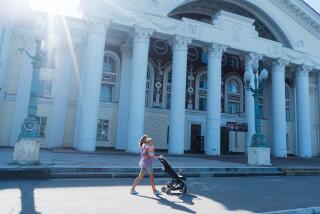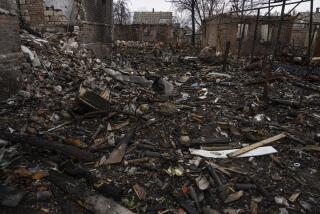TURMOIL IN SOVIET REPUBLICS : Pogroms--New Violence, Painful Memories
- Share via
The word pogrom , which is turning up in reports on the ethnic fighting in Transcaucasia, is both familiar and terrifying. Soviet officials and the Soviet media are using it to describe the violent clashes between Armenians and Azerbaijanis, but it calls up dreadful memories for other peoples, particularly Jews.
Pogroms were carried out against Russian Jews under the czars, long before there was a Soviet Union, and later against Jews in Nazi Germany and Poland.
Originally, pogrom, a Russian word, meant “destruction” or “riot.” It took on its present meaning--mob attacks against lives and property, notably but not exclusively the lives and property of Jews--in the 19th Century.
Pogroms grew out of the czarist government’s attempt, after its defeat in the Crimean War of 1854-56, to Russify the diverse peoples it ruled, not only in Russia but also in Poland, Georgia, the Baltic region and elsewhere. The language, literature and culture of these peoples were to be swept away.
The Jews, prominent in commerce and the professions although they had been victims of social and economic discrimination for centuries, were an inviting target.
By the 1880s, there was legal discrimination against Jews in schools and universities and in economic life. The police began to take a hand, actively or simply by standing clear, as Jewish shops were destroyed and their owners assaulted.
In 1905, after Russia’s defeat in the war with Japan, political discontent grew in Russia, and the authorities encouraged pogroms as a means of diverting anti-government hostility to a convenient scapegoat--not only Jews but Armenians as well. This was the time of the so-called Black Hundreds, anti-Semitic gangs that with official approval carried out pogroms in hundreds of cities and town across Russia.
The word pogrom has been applied to the vicious anti-Semitism that was prevalent in Nazi Germany and in the countries occupied by Nazi Germany in World War II, but the systematic killing of millions of Jews during this period is more commonly referred to as the Holocaust.
More to Read
Sign up for Essential California
The most important California stories and recommendations in your inbox every morning.
You may occasionally receive promotional content from the Los Angeles Times.













